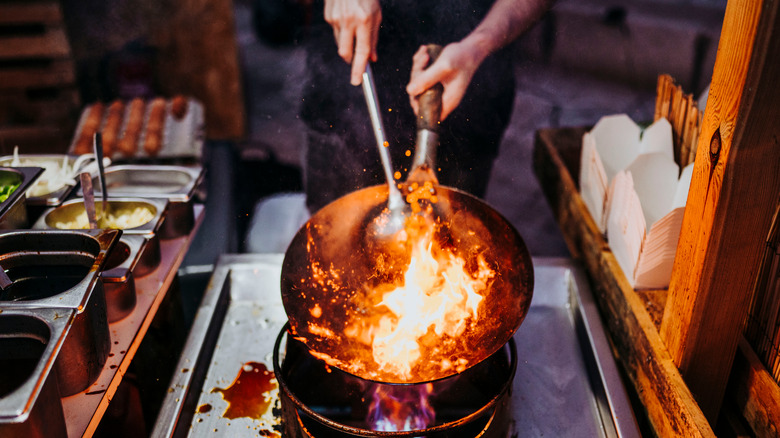Wok Chefs Can Never Really Leave Behind Gas Stovetops
Restaurant chefs strongly prefer gas stoves over electric induction cooktops. According to the National Restaurant Association, 76% of restaurants use natural gas. When only looking at full-service restaurants, that percentage is actually more like 87%. Even more telling, 90% of those restaurateurs believe that the quality of the food they make would suffer if they were not using gas stoves.
Some chefs — like Christopher Galarza — refute many of the myths around the gas versus electric stove debate. Galarza founded Forward Dining Solutions and works as a consultant with professional kitchens to help them make a smooth transition away from gas to electric induction cooktops that use a magnetic field to conduct heat. According to Galarza and other pro-electric folks, electric cooktops run more efficiently, are more cost-effective in the long run (despite the high initial investment), have much better heat control, are safer, and simply don't warm up the kitchen as much, allowing for a more comfortable environment for cooks.
While there are many reasons to make the switch to electric, there are some instances where an electric cooktop simply will not cut it.
Why do people love cooking with natural gas?
In the 1930s, the fossil fuel industry launched a full-on campaign to convince consumers that natural gas was far superior to electric stoves, mainly citing cost-effectiveness and better cooking results. Also, one key to their campaign was clever marketing that aligned gas stoves with an aspirational high-class lifestyle.
The success of this marketing has held firm despite increasing evidence of the dangers of cooking inside with natural gas. According to NPR, the emissions from natural gas in both commercial and residential settings account for 13% of total heat-trapping emissions. A study from the UCLA Fielding School of Public Health also looked at an amalgamation of other epidemiological studies and found that children living in homes that routinely use gas stoves have a 42% higher chance of developing asthma.
The fossil fuel industry has fought back with legislative lobbying and marketing — including social media campaigns in partnership with famous influencers. These efforts have even gone as far as planting their own representatives to pose as neighbors on the Next Door app (via Mother Jones). Gas stoves are a big money maker that the fossil fuel industry doesn't want to lose out on.
Gas stoves can sometimes be irreplaceable
While there is much to debunk about the necessity of gas stoves, in some cases, the open flame of a gas burner achieves an effect that cannot be replicated with an electric cooktop. Chef and author J. Kenji López-Alt, who wrote the book "The Wok: Recipes and Techniques," said that the results Chinese chefs are able to create using gas burners would be impossible on an induction stovetop. Electric stovetops only transfer heat when the pan is in direct contact with the burner.
Wok hei, the signature charred flavor found in wok cooking, results from the oil igniting as flames come up the edge of the pan while the chef is holding the wok above the flame and tossing the ingredients. Wok hei is the main reason why Chinese food always tastes better at restaurants, and its flavor is nearly impossible to replicate at home. López-Alt suggests that spreading your sauteed ingredients out in a single layer on a sheet pan and singeing them with a blowtorch before returning them to a well-seasoned wok for saucing may be the best way to achieve that smoky flavor at home.
"It's kind of like asking, 'Why can't a guy doing Texas barbecue just use an electric stove instead of a wood fire?' Well, that's not going to happen because that's really the essential part of the flavor of the dish," J. Kenji López-Alt told The Washington Post. For now, the debate continues.


